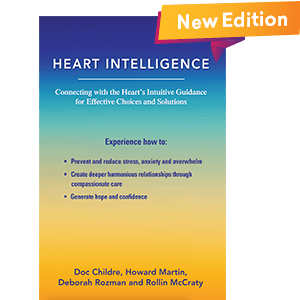Excerpted from Heart Intelligence: Connecting with the Heart’s Intuitive Guidance for Effective Choices and Solutions; Chapter 8 The Difference Between Care and Overcare
By Doc Childre
Download Ebook Sample

Download the Introduction by Doc Childre and Chapter 1 from the new edition of Heart Intelligence: Connecting with the Heart’s Intuitive Guidance for Effective Choices and Solutions.
As we spiritually mature into our higher potentials, increased care comes with it. Caring more is a most valid way for love to be stepped down into practical applications. This would solve and prevent many problems that we unconsciously create and repeat.
For the next few paragraphs, I’ll comment on the difference between care and overcare. Overcare is when our initial feelings of care about something or someone turn into obsessive worry, anxiety, or projecting the worst—this usually escalates into emotional depletion and the obvious stress load that follows. Our care is one of our highest assets, but when our care turns into overcare, it drains our energy and our health bears the consequences. Managing our care nurtures us and others, while overcare hinders our effectiveness with energy-draining mind loops even when our intentions are well-meaning.
Download Ebook Sample

Download the Introduction by Doc Childre and Chapter 1 from the new edition of Heart Intelligence: Connecting with the Heart’s Intuitive Guidance for Effective Choices and Solutions.
We know that numerous caregivers experience a high rate of energetic burnout from not being able to manage the energies of their care. That’s understandable because managing our care has a predictable learning curve and it’s not an easy task for people who care deeply. It’s part of an emotional maturing process in learning the economy of balanced care.
Below are some typical areas where overcare can overwhelm us at times, lowering our vibration while draining our energy:
- Work
- Relationships
- Money
- Diet
- Children
- Parents
- Health
- Past regrets
- How we look
- How we feel
- Future security
- How we will come out
- Feeling lack
- Comparisons
- What people think of us (and what we privately think of them)
- Learning new technology
Many issues on the list are often draining our energy at the same time, reducing our resilience and our capacity to feel good, while compromising our health and vitality. Then we wonder why we don’t feel like our full-blown self. A stealthy ingredient in overcare is its seductive power to justify itself, while leaving us blindsided to its energy-sapping consequences. With practice, we can cue up our intuition to alert us when overcare begins to invade our feelings and perceptions. The practice of identifying and deleting overcare can save a pivotal amount of energy and health risk along the way.
Eliminating overcare does not reduce our care; it strengthens the effectiveness of our care by bringing it into balance and coherent alignment with our heart. Any time our outgoing energy is balanced, we are smarter on our feet. View overcare (unmanaged care) as a thriving emotional virus, hidden by society’s unconscious agreement that overcare is not accountable. With our heart’s intuitive guidance and commitment, we can free ourselves from the seductive stress that overcare and constant worry bring us.
An excessive (obsessive) amount of overcare and emotional turbulence can unconsciously stream from trying to navigate the learning curve of new software, computers, smartphones, or other “must-have” devices. Yes, they are helpful, but that doesn’t expunge the cumulative stress deficits accrued from the anxiety of having to keep up with it all, especially if you don’t have a knack for it. A balancing gesture would be to occasionally do a reality check and ask: Are we consumers of our technology or are we consumed by our technology? Are we the programmers of our gadgets or are we pawns of our gadgets? When addiction creeps in, we become the pawns and the gadgets become our master. Finding balance in all things is a heart-intelligent practice in these accelerated times, especially when technology is fixing to explode into science fiction-type potentials. Have fun but stay in charge, or you become the pawn. There’s no gray, you know.
Distinguishing Care vs. Overcare
At first, trying to distinguish the difference between balanced care and overcare can seem complicated. This is because when we are in overcare, we can tend to feel that’s when we are caring the most. Many issues we start to care about morph into worry. Excessive worry is a classic example of when overcare is fooling us into thinking that it’s effective care. In our heart, most of us know that free-to-roam worry eventuates into personal energy deficits and compromises our well-being. (If we truly believed that excessive worry really helped us, we would encourage our friends and children to go find a corner and worry each time life’s challenges come up.)
You may ask how can people not go into worry and anxiety over some things or situations that put others or themselves in harm’s way? There are serious things that happen in life that amp up our concern—but most overcare energy drain is about things and issues that often don’t even matter that much. Yet we’re addicted to the habit or drama of overcare. These are especially the situations where managing our care would be effective. Overcare is a deeply imprinted human tendency that’s handed down through each generation. It’s like a virus that can only be cured through self-adjustment.
Others can’t do it for us. There’s no vaccine; however, we don’t need one, because overcare is nothing that we can’t handle with a little conscious focus along with our heart’s commitment to practice. Observe yourself for a few days and see how often you can catch overcare occupying your mind and feelings regarding yourself, others, or issues. When you find yourself in worry, anxiety, or distress from overcare try the following exercise.
Overcare Exercise
- While breathing in a relaxed pace, pretend you are breathing through your heart or chest area and imagine calming your mind and emotions with your breath. (Calm emotions help to create a space that enables intuitive access for clearer discernment and choices when evaluating situations.)
- Once you’ve calmed your mental and emotional vibrations, then commit to repeating this breathing exercise whenever you find yourself fading back into overcare. Sometimes after a few rounds of doing this, you’ll find your energies more balanced and easier to manage.
- As you practice, don’t be concerned if it doesn’t work every time. It won’t. (You’ll get plenty more chances.) Being genuine strengthens the power of your heart’s intention.
Approach this exercise with ease, not force. With practice, you will become more conscious of when you are overcaring, and often you can just stop it on the spot and bring your energy back to balance. Practice increases the strength for actualizing intentions that otherwise fizzle before they land. Heart energy added to any practice brings fortitude and resilience into our intentions, especially when our commitments start to shrink.
This simple exercise is not just for overcare and worry; it’s helpful for any stressful challenge or situation that calls for clearer discernment without the emotional override. Remember that worry is one of the highest contributors to overcare because it seems so “legal“ and normal. I’ve found that understanding and managing overcare is one of the most forward-moving steps we can take in our personal transformation process.

